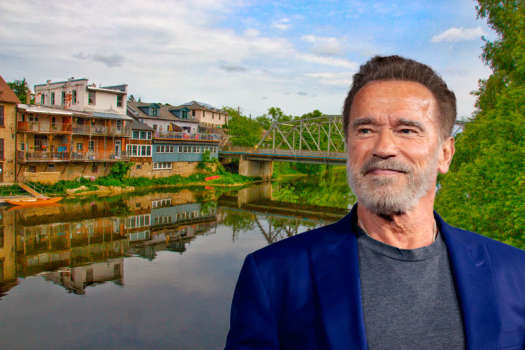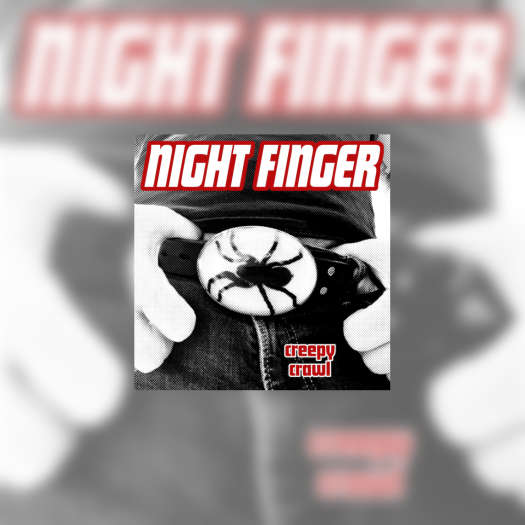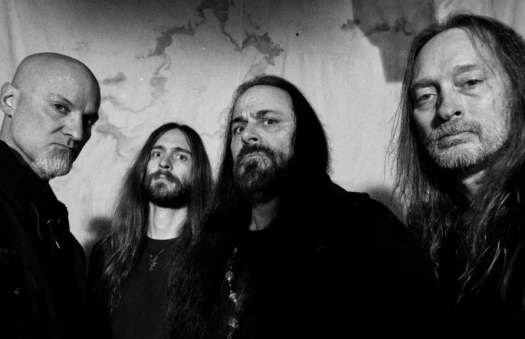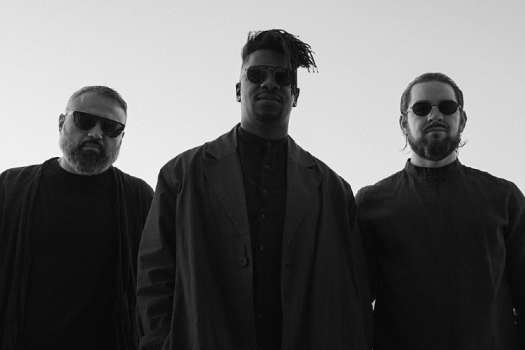"The Beatles was a period of my life. ... I came over to America, and just decided I'd like to live here."
The Lost Weekend: A Love Story tells the tale of a relatively unknown period in John Lennon's life: his separation from Yoko Ono in 1973 and subsequent romantic relationship with May Pang. The documentary, directed by Eve Brandstein, Richard Kaufman and Stuart Samuels, explores the 18-month relationship, which Lennon referred to as his "lost weekend," in unprecedented detail. Importantly, it is the first major work on this period from Pang's perspective.
Not much is known about Pang by the wider public, and The Lost Weekend aims to change that right off the hop. The film begins with Pang narrating the story of her youth in New York City, where Pang's parents settled after emigrating from China in search of the American Dream. Sketched animations of real-life events accompany Pang's narration, adding tangibility to her story. Whether the scene is her mother's place of work (a laundromat aptly called "OK Laundry") or the Catholic school where Pang butted heads with the nuns, these scenes deepen the impact of what Pang has to say.
By the time Pang got out of high school, she was ready to do things her own way. When she was just 19, Pang visited Apple Records' American headquarters to apply for a job. A week later, she was hired and quickly cut her teeth at Apple. Early on in her career, she worked on two avant-garde films for Lennon and Ono: Up Your Legs Forever and Fly. Pang recalls that "there were no flies in New York in the dead of winter," so when she caught one in the kitchen of a Chinese restaurant, she brought it back to be used in the film.
Over time, Pang got to know the Lennons very well. She was flown out to Tittenhurst Park in Ascot, UK, where the couple were living, to assist with the "Imagine" video shoot. Impressed with her professional skills, the Lennons promoted her to full-time assistant, and soon took over a whole floor of New York's St. Regis hotel. Pang got her turn in the limelight, too: she famously appeared in a bag on a 1971 episode of The Dick Cavett Show, helping the Lennons promote "bagism" — their satirical take on prejudice (i.e. how you judge someone when their appearance is hidden by a bag?).
By 1972, Lennon's career was on a downturn. His album Some Time in New York City bombed with critics and on the charts. Additionally, Lennon's political activism led to him being labelled as an "enemy of the people" by the Nixon administration. His relationship with Ono was on the rocks and he had also been neglecting his son, Julian, whose attempts to call were often turned down by Pang (at the Lennons' behest).
The Nixon administration regularly followed the Lennons by car and bugged their phones. Eventually, they decided enough was enough, and moved to the Dakota, a gated apartment complex next to Central Park. However, the safer living situation was not enough to quell the discontent in John and Yoko's relationship; Yoko had recently discovered John had been sleeping with other women and decided to separate from him.
Shockingly, Yoko asked Pang to go out with him in the meantime. At this point in The Lost Weekend, the extent to which Pang was used by John and Yoko for personal ends becomes clear. The doc queues this up well, with Pang expressing her discomfort with being pressured to turn down Julian's phone calls, or when she responds with disbelief when Yoko suggests pacifying John romantically because she happens to be their personal assistant.
Pang initially resisted Lennon's advances; but in her own words, she admits, "John Lennon charmed the pants off me." Pang then reveals to viewers that she cried after the first time her and Lennon had sex, asking him, "What does this mean?"
"I don't know," responded Lennon, which was a harbinger of things to come. As their relationship blossomed, Pang and Lennon decided it would be best to leave New York City and live in Los Angeles for a while.
The couple rented producer Lou Adler's mansion in Bel-Air and took a vacation, driving around America and being tourists. An attempt to record a rock 'n' roll album with Phil Spector and the Wrecking Crew ended with the notoriously unstable producer firing his gun off in the studio. Lennon was unable to retrieve the tapes from Spector, who had made off with them in his car. "I'm not even going to say what happened [at those sessions]," reflected Lennon. "Some of it was ridiculous." The record was eventually released in 1975.
The Lost Weekend reveals that Lennon could be physically abusive to Pang at times, pushing her hard against a wall when he was angry. He had also begun binge drinking in clubs with the Hollywood Vampires, an informal L.A. drinking group consisting of himself, Harry Nilsson, Alice Cooper, Bernie Taupin, Keith Moon, Micky Dolenz and Ringo Starr. "Acting like a teenager, in Hollywood, in public," Lennon said, recalling his antics during this time. "We formed a teenage gang. Except we were all 30."
Tiring of Lennon's behaviour, Pang returned to New York City and called Yoko to inform her she was back in town for good. Yoko again insisted Pang go back to John, claiming that he needed her support because Julian and John's ex-wife Cynthia were coming for a visit. It seems that, try as she might, Pang could not escape the interpersonal struggle between John and Yoko at this time, always playing second fiddle but nonetheless genuinely caring for Lennon and committed to keeping her job.
Ultimately, Pang agreed to return to Los Angeles, and, according to Julian's recollection, helped ease tensions in the room. "I think May made [the environment] a lot easier for me, as a young kid," observes Julian. "I recall hanging out with May a lot. ... We were always giggling and fooling around." Julian adds that Pang and Cynthia "got on famously" and formed a friendship that would last the rest of Cynthia's life.
By 1974, Pang and Lennon appeared in public together often. A pivotal moment in The Lost Weekend takes place at L.A.'s Troubadour nightclub, the same night Lennon and Harry Nilsson were infamously ejected for heckling the Smothers Brothers. Seated at a table beside Pang, Lennon leaned in for a very public kiss, and from that evening on, their pictures frequently made the papers. When the attention got tiring, the couple hid away in another rented mansion (this one once frequented by Marilyn Monroe and two Kennedys). There, Lennon produced Nilsson's Pussy Cats record and continued to heavily imbibe. It was during these sessions that Lennon reunited with Paul McCartney for the first time in years, and a famous photo of the two lounging on pool chairs was taken by Pang. McCartney, of all people, also acted as an emissary for Yoko. Pang reveals to viewers that, at one point during the visit, McCartney pulled his old songwriting partner into a back room to pass on Yoko's message: "Do you still love Yoko?" McCartney asked. "Do you want to get back with her? Here's what you have to do..."
Pang and Lennon's relationship carried on for a while longer. They vacationed in Long Island with Julian and rented a house on 52nd Street in New York together. Eventually, however, Yoko decided that she was ready to take John back.
In early 1975, Lennon decided to take a trip to New Orleans for the weekend, without Pang. The following Monday, he met her outside his dentist appointment and broke up with her. "Listen, Yoko's allowed me to come home," Lennon said. Pang was hurt, expecting a longer future with him.
The pair stayed in touch for the last years of Lennon's life, but aside from a few trysts, this rendezvous marked the end of their romance. "I knew I wasn't the only woman John loved," she admits. Pang hadn't talked to Lennon for a year when she found out he had been shot dead in New York City.
In 1989, Pang married producer Tony Visconti, with whom she has two children. Pang maintained a friendship with Julian and Cynthia until the latter's death in 2015. She never forgot her time at Apple nor her relationship with Lennon. Telling her story in her own words has allowed Pang to put to rest decades of rumour and gossip.
Yes, she was used unfairly by the Lennons, as a Band-Aid solution to their professional and personal problems. What The Lost Weekend: A Love Story makes clear, though, is that Pang wasn't just a woman Lennon loved. She helped put Lennon's relationship with Julian back together and got him through a very difficult period in his life, not to mention her countless hours of production assistance and creative guidance on numerous artistic endeavours. For all of these reasons, The Lost Weekend successfully makes the case that May Pang is owed more than a simple footnote in rock history.
(Iconic Events)The Lost Weekend: A Love Story tells the tale of a relatively unknown period in John Lennon's life: his separation from Yoko Ono in 1973 and subsequent romantic relationship with May Pang. The documentary, directed by Eve Brandstein, Richard Kaufman and Stuart Samuels, explores the 18-month relationship, which Lennon referred to as his "lost weekend," in unprecedented detail. Importantly, it is the first major work on this period from Pang's perspective.
Not much is known about Pang by the wider public, and The Lost Weekend aims to change that right off the hop. The film begins with Pang narrating the story of her youth in New York City, where Pang's parents settled after emigrating from China in search of the American Dream. Sketched animations of real-life events accompany Pang's narration, adding tangibility to her story. Whether the scene is her mother's place of work (a laundromat aptly called "OK Laundry") or the Catholic school where Pang butted heads with the nuns, these scenes deepen the impact of what Pang has to say.
By the time Pang got out of high school, she was ready to do things her own way. When she was just 19, Pang visited Apple Records' American headquarters to apply for a job. A week later, she was hired and quickly cut her teeth at Apple. Early on in her career, she worked on two avant-garde films for Lennon and Ono: Up Your Legs Forever and Fly. Pang recalls that "there were no flies in New York in the dead of winter," so when she caught one in the kitchen of a Chinese restaurant, she brought it back to be used in the film.
Over time, Pang got to know the Lennons very well. She was flown out to Tittenhurst Park in Ascot, UK, where the couple were living, to assist with the "Imagine" video shoot. Impressed with her professional skills, the Lennons promoted her to full-time assistant, and soon took over a whole floor of New York's St. Regis hotel. Pang got her turn in the limelight, too: she famously appeared in a bag on a 1971 episode of The Dick Cavett Show, helping the Lennons promote "bagism" — their satirical take on prejudice (i.e. how you judge someone when their appearance is hidden by a bag?).
By 1972, Lennon's career was on a downturn. His album Some Time in New York City bombed with critics and on the charts. Additionally, Lennon's political activism led to him being labelled as an "enemy of the people" by the Nixon administration. His relationship with Ono was on the rocks and he had also been neglecting his son, Julian, whose attempts to call were often turned down by Pang (at the Lennons' behest).
The Nixon administration regularly followed the Lennons by car and bugged their phones. Eventually, they decided enough was enough, and moved to the Dakota, a gated apartment complex next to Central Park. However, the safer living situation was not enough to quell the discontent in John and Yoko's relationship; Yoko had recently discovered John had been sleeping with other women and decided to separate from him.
Shockingly, Yoko asked Pang to go out with him in the meantime. At this point in The Lost Weekend, the extent to which Pang was used by John and Yoko for personal ends becomes clear. The doc queues this up well, with Pang expressing her discomfort with being pressured to turn down Julian's phone calls, or when she responds with disbelief when Yoko suggests pacifying John romantically because she happens to be their personal assistant.
Pang initially resisted Lennon's advances; but in her own words, she admits, "John Lennon charmed the pants off me." Pang then reveals to viewers that she cried after the first time her and Lennon had sex, asking him, "What does this mean?"
"I don't know," responded Lennon, which was a harbinger of things to come. As their relationship blossomed, Pang and Lennon decided it would be best to leave New York City and live in Los Angeles for a while.
The couple rented producer Lou Adler's mansion in Bel-Air and took a vacation, driving around America and being tourists. An attempt to record a rock 'n' roll album with Phil Spector and the Wrecking Crew ended with the notoriously unstable producer firing his gun off in the studio. Lennon was unable to retrieve the tapes from Spector, who had made off with them in his car. "I'm not even going to say what happened [at those sessions]," reflected Lennon. "Some of it was ridiculous." The record was eventually released in 1975.
The Lost Weekend reveals that Lennon could be physically abusive to Pang at times, pushing her hard against a wall when he was angry. He had also begun binge drinking in clubs with the Hollywood Vampires, an informal L.A. drinking group consisting of himself, Harry Nilsson, Alice Cooper, Bernie Taupin, Keith Moon, Micky Dolenz and Ringo Starr. "Acting like a teenager, in Hollywood, in public," Lennon said, recalling his antics during this time. "We formed a teenage gang. Except we were all 30."
Tiring of Lennon's behaviour, Pang returned to New York City and called Yoko to inform her she was back in town for good. Yoko again insisted Pang go back to John, claiming that he needed her support because Julian and John's ex-wife Cynthia were coming for a visit. It seems that, try as she might, Pang could not escape the interpersonal struggle between John and Yoko at this time, always playing second fiddle but nonetheless genuinely caring for Lennon and committed to keeping her job.
Ultimately, Pang agreed to return to Los Angeles, and, according to Julian's recollection, helped ease tensions in the room. "I think May made [the environment] a lot easier for me, as a young kid," observes Julian. "I recall hanging out with May a lot. ... We were always giggling and fooling around." Julian adds that Pang and Cynthia "got on famously" and formed a friendship that would last the rest of Cynthia's life.
By 1974, Pang and Lennon appeared in public together often. A pivotal moment in The Lost Weekend takes place at L.A.'s Troubadour nightclub, the same night Lennon and Harry Nilsson were infamously ejected for heckling the Smothers Brothers. Seated at a table beside Pang, Lennon leaned in for a very public kiss, and from that evening on, their pictures frequently made the papers. When the attention got tiring, the couple hid away in another rented mansion (this one once frequented by Marilyn Monroe and two Kennedys). There, Lennon produced Nilsson's Pussy Cats record and continued to heavily imbibe. It was during these sessions that Lennon reunited with Paul McCartney for the first time in years, and a famous photo of the two lounging on pool chairs was taken by Pang. McCartney, of all people, also acted as an emissary for Yoko. Pang reveals to viewers that, at one point during the visit, McCartney pulled his old songwriting partner into a back room to pass on Yoko's message: "Do you still love Yoko?" McCartney asked. "Do you want to get back with her? Here's what you have to do..."
Pang and Lennon's relationship carried on for a while longer. They vacationed in Long Island with Julian and rented a house on 52nd Street in New York together. Eventually, however, Yoko decided that she was ready to take John back.
In early 1975, Lennon decided to take a trip to New Orleans for the weekend, without Pang. The following Monday, he met her outside his dentist appointment and broke up with her. "Listen, Yoko's allowed me to come home," Lennon said. Pang was hurt, expecting a longer future with him.
The pair stayed in touch for the last years of Lennon's life, but aside from a few trysts, this rendezvous marked the end of their romance. "I knew I wasn't the only woman John loved," she admits. Pang hadn't talked to Lennon for a year when she found out he had been shot dead in New York City.
In 1989, Pang married producer Tony Visconti, with whom she has two children. Pang maintained a friendship with Julian and Cynthia until the latter's death in 2015. She never forgot her time at Apple nor her relationship with Lennon. Telling her story in her own words has allowed Pang to put to rest decades of rumour and gossip.
Yes, she was used unfairly by the Lennons, as a Band-Aid solution to their professional and personal problems. What The Lost Weekend: A Love Story makes clear, though, is that Pang wasn't just a woman Lennon loved. She helped put Lennon's relationship with Julian back together and got him through a very difficult period in his life, not to mention her countless hours of production assistance and creative guidance on numerous artistic endeavours. For all of these reasons, The Lost Weekend successfully makes the case that May Pang is owed more than a simple footnote in rock history.




